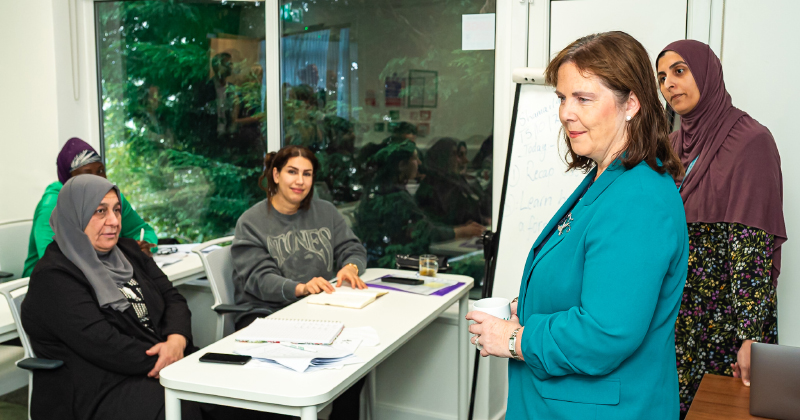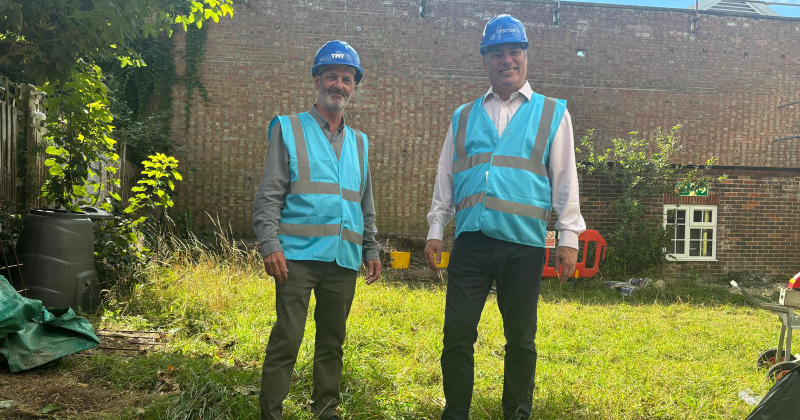The uncertainty over what will be taught in the freshly painted classrooms of the Workers’ Education Association’s new centre poignantly reflects the state of flux pervading all of adult education right now.
Chief executive Simon Parkinson is hoping the new Whitehawk Community Learning Hub, which will be the WEA’s biggest centre when it opens in January, will live up to its name and deliver the type of community learning that the WEA has built its reputation on for the last 122 years.
But given the chancellor’s pre-Budget warning shot last week and recent cuts to adult education funding, is this just wishful thinking from a man who cares deeply for the plight of his sector?
As he hands me a high-vis vest and hard hat for a tour of the 5,500 square foot redbrick building in Brighton, Parkinson tells me how the hub will (“hopefully”) act as a model for at least eight other “one-stop shop” community learning centres across the country – a “Sure Start model for adults”.
But that all depends on the willingness of the adult education sector’s new caretaker, the Department for Work and Pensions, and the various new and soon-to-be-created combined authorities, to agree to fund such ventures amid economic turbulence.
Adult education can’t just be about skills for work
The WEA is “already quite well embedded” with the DWP, and Parkinson welcomes the department’s intentions now it has adult skills in its remit to “get rid of some of the duplication” with employability courses, and remove some “uncertainty” about where job seekers can go for training.
“But it can’t come at the cost of lifelong learning, tailored learning and community learning. Adult education can’t just be about skills for work, it’s got to be skills for life as well,” he says.

A wounded mothership
The WEA was founded in 1903 on the lofty principles of empowering working people to improve their own lives, participate more fully in democracy and shape social progress. That meant teaching the liberal arts as well as the vocational training required to meet national economic needs.
Between the wars, many WEA members emigrated overseas and opened WEA branches in Australia, Canada and New Zealand that are still thriving today, with the UK’s WEA being “the mothership”.
“We showed everybody how to do adult education and were world leaders,” says Parkinson, proudly. But “we are now a little bit behind the curve compared to our overseas counterparts”.
Adult education is increasingly viewed through a narrow utilitarian lens, with arts and crafts, health, wellbeing and cultural learning being replaced by the types of skills and employability sessions which are popular with politicians, but not necessarily accessible to the people that need them.
Parkinson believes that community learning activities, like health and wellbeing sessions, are essential for incentivising the economically inactive through their doors, where they could then be encouraged to progress to skills and employability provision.

Charity reform
The changing plight of the WEA reflects the turmoil facing the entire adult education sector. The Learning and Work Institute found the number of adults engaging with learning dropped nine percentage points to 21 per cent this year.
Other historic adult education pioneers are in a state of flux, too. Residential provider Northern College is set to merge with Barnsley College, and the Mary Ward Centre in London, now under financial intervention, is having to hike its fees by around 26 per cent this year.
In the wake of Covid, Parkinson spoke of his wish to open a community learning centre in every town. But instead, the WEA has had to close many of its local branches. It now has 80 active branches, down from 122 in 2023-24 and over 600 in 2015-16.
A “root and branch” staffing restructure scrapped regional arrangements in favour of “specialist teams”, and its number of contracted tutors dropped from 506 to 349 in the year to July 2024. It reached around 35,000 learners across England and Scotland that year, compared to 60,000 in 2015-16.
But although it is relatively revenue-poor, the WEA finds itself in the strange predicament of being capital-rich.
In 2023-24, although its income fell “significantly short of expectations, resulting in a significant operational loss”, its total income actually rose from £27.5 million to £32.7 million after the charity received three capital grants worth £9.6 million to develop its estate (£6.9 million being recognised that year). It is an odd paradox that the government has been so generous in supporting the WEA’s capital endeavours, while at the same time reducing the funding it needs to fill all the new classrooms it helped to build.
This year, “methodology changes” meant the DfE’s cuts to the adult skills fund turned out to be £250,000 worse than the 6 per cent it told providers to expect in March. After the WEA launched a successful business case, this was reduced to £30,000. That amount “isn’t going to put us out of business”, says Parkinson, “but there’s a lack of clarity around how they’re doing the numbers”.
The end of the Multiply numeracy scheme earlier this year will also impact the WEA; last year £1.63 million of its income came from the national programme.

Adapting to survive
But ultimately, this is a tale of adaptation rather than abolition.
The WEA has seen “growing demand” for online learning since the pandemic, with almost half of its training now provided online through around 6,000 courses.
Because the charity can no longer afford to provide online arts and cultural courses free or at reduced cost, from September it has been asking for full-cost payment from those with an income of over £20,000 a year. Parkinson claims the new rate of around £12 an hour (roughly double what it was) is “still competitive”.
The “hope” is that if they can get the paid-for courses to “wash their own face”, then the money made will go towards hardship funds for those unable to afford the provision.
“One of our strategic goals is that everybody’s welcome at the WEA; it’s just how we find the money to help them,” says Parkinson. “But we’re not going to turn people away.”
So far, the paid online provision has had “good uptake” despite “some trouble” with discontent over the price hike.
The charity’s social media disinformation course remains free for all because “we thought it was an important issue”. The course, built off the back of a lecture by BBC journalist Amanda Ruggeri, is franchised around the world as part of the WEA’s charitable purpose.
“It opens our front door to people; if they do that for free and enjoy it, maybe they do another course.”

Driving change
The WEA has also grown it’s maths, English and ESOL (English for speakers of other languages) provision in recent years. It has been working “at scale” for just over a year under the Afghanistan resettlement scheme, teaching Afghans on Ministry of Defence bases. Such work is not without its controversies. One of the MOD bases is in Lincolnshire, where mayor Andrea Jenkyns announced last month that she wanted to redirect ESOL funding to “improving literacy for people in Lincolnshire”.
Parkinson points out that it is not just English language skills that the WEA is teaching Afghans refugees; “We’re doing plenty of British values, gender equality, functional skills. And the most popular thing they want is driving test theory,” he explains.
The WEA is currently delivering 32 courses with over 500 enrolments at four MOD sites (of which two remain open) and two hotels. They had been working in other hotels, but Parkinson says (referring to recent protests against asylum seekers and refugees outside hotels) that they “had to really think carefully about how we protect our colleagues, not from the learners but from the people outside, as they come in and out”.

Devolution dramas
The WEA has had to become ever more fleet of foot, moving on from some places where it had longstanding historic links, to where new combined authorities are more amenable.
The charity currently boasts contracts with all the existing combined authorities except Conservative-controlled Tees Valley (Parkinson admits they “didn’t perform as well as we would have liked” in the first year of devolution there). But devolution has been a steep learning curve.
Not all combined authorities have been enthusiastic to engage. The WEA initially lost its grant funding in Cambridgeshire and Peterborough, but later regained it. And last year, it had to threaten legal action before the new North East Combined Authority would agree to continue its adult education grant.
In 2023-24 its performance with mayoral combined authorities was “particularly poor”, accounts said. A £1 million restructure took place to address the challenge of “more skills focused” mayoral contracts where “funding is performance based”. Its total income from mayoral areas dropped from £7.5 million in 2022-23 to £6.2 million that year, while fee income fell from £859,000 to £591,000.
But Parkinson is quick to react to potential opportunities.
In Reform-controlled Derbyshire, at least five adult education centres have been earmarked for closure, but as most of Derbyshire’s adult education funding has now been transferred to the region’s new East Midlands Mayoral Strategic Authority, which is already working with the WEA, the charity is “talking” to them about whether it can save the centres.
“If there’s one of those learning centres that Derbyshire has decided they can’t make work but there’s still a need, then maybe we can step in and help with that,” he says.
Parkinson currently spends “half his life” going around authorities in the process of devolving and urging them not to cut their existing provision.
He praises new mayoral combined authorities in East Midlands, North Yorkshire and Cornwall for their “sensible approach” in “talking to their existing provider network and almost changing nothing in year one, whilst they start working out what to do”, rather than “throwing everything up in the air”.
“When you just cut everything, it makes it so much more difficult to get things up and running again,” he says. “We know it needs to evolve. But don’t force it. Work with us and it’ll be better for everybody, particularly for the learners – it’s their provision and they don’t understand that [their area] was not devolved and now it’s devolved. They just understand that their course has stopped… that’s the most difficult thing.”
“Good conversations” have also taken place with Lancashire and Cornwall, and with Suffolk, which is set to forge a new mayoral combined authority with Norfolk.
“We’re in a good place now with devolution and think we know how to do it,” says Parkinson.

Footprint changes
The WEA is repurposing centres in Scunthorpe, Nottingham and Leicester, where the WEA’s head of estates, Mitch Bell, says they have “really gone out to get into the community”. It also has centres in Bristol, Southampton and Leeds, and is looking to open new centres in London.
The new Nottingham centre, which is “almost carbon neutral” with solar panels and electric vehicle charging points, was opened last month by East Midlands mayor Claire Ward.
The WEA is also selling a building it has owned for 34 years in Newcastle (which it is no longer using) and is opening provision in Sunderland instead.
Parkinson says the WEA’s flexibility is an advantage it has over colleges. “You can’t move a college site from Newcastle to Sunderland because the needs shifted, but we can. We can close that building in Newcastle, it’s not fit for purpose anyway, and we’ll reinvest the money that we can from that and move to a community that needs it more.”
Parkinson hopes the WEA’s new centre in Scunthorpe will become a steel workers’ community hub. “Whether it comes from the adult skills fund, or whether Andrea [Jenkyns, mayor of Lincolnshire] will fund it or not, I don’t really care. Just, let’s get it going. We’ll find the revenue from somewhere.”

Bright future in Brighton?
The uncertainty facing WEA’s new Brighton hub is compounded by the fact that from next year, the city will be part of a new mayoral combined county authority covering the whole of Sussex, and nobody knows whether it will prioritise adult education.
The WEA bought the 90-year-old former pub for £1 million two years ago with proceeds from selling another building, and it has been a “long journey” since then to upgrade it, supported by an £8.65 million FE capital transformation grant.
Such grants are more commonly associated with FE colleges than adult providers, and Bell praises the DfE for showing “so much flexibility” on the project.
The Brighton hub was previously rented out to an NHS provider, the Wellsbourne Healthcare clinic, and Parkinson is pleased to welcome them back into the building when it reopens. He hopes they will refer patients for the kind of “social prescribing” activities that the WEA could provide. But that all depends on health partners being willing to fund it.
“If they’re saying, ‘you’d benefit from a yoga class or mindfulness class’, well – you could come through this door here and we could provide that”, says Parkinson, gesturing to a freshly painted room with its own kitchen space and toilets.
Parkinson takes me through a future ICT suite and another kitchen which he tells me he envisions becoming a “working café”, providing much-needed “barista training” to a town heavily dependent on its hospitality industry.
There are hopes for another room to be used for arts and textiles workshops. “We’ve put low-level lights in, to help with sewing and needleworking,” explains Bell. He is optimistic that in artsy Brighton, even if such provision cannot be funded via public bodies, people will be willing to pay for it anyway.
Parkinson adds: “We’ll be led by what the community wants and needs.
“So actually, if there is a need or a desire for people to do some textiles work, then our job is to facilitate that. We’ll fund what we can through the adult skills fund, then we’ll shout from the rooftops about the difference it’s making and that somebody should fund it.”
















Your thoughts